What exactly is employee engagement, and why should we care? And if we do understand it, who is responsible for it? Is engagement HR’s purview? Are managers responsible for their staff’s engagement? Or should employees own their own engagement?
Defining Engagement
First, let’s define engagement. Most HR pros believe they understand instinctively what it means, but there are few solid and succinct definitions out there. Kind of like the Supreme Court and pornography, we just know it when we see it. Or, more usually, we know when it’s missing.
There are a number of good definitions for engagement, but the one I like the best is this one from Richard Finnegan’s The Power of the Stay Interview: Employee engagement is when ‘employees are fully committed each day to giving their all to help their organization succeed.’
Who Owns It?
Whose job is it to make sure those employees are fully committed? The real answer is that engagement is everyone’s responsibility. HR has the subject matter expertise to explain what engagement is and why it matters. Managers are crucial because, as we all know, people join organizations and leave managers. And in the end, it’s up to each employee to find that connection that drives them to do their best beyond a paycheck.
The Rules of Employee Engagement
But how do we make that happen? How can we get our employees to be that committed? I’ve found that these three rules help.
1. Understand HR’s Role
As HR practitioners, we need to understand our role. As the gatekeepers of policy, we need to make sure that our policies are working for our employees, and not creating obstacles. Remember that most compliance, at heart, was designed to protect workers. Let’s not allow the administrative burden of proving we care for employees become a stumbling block to that care. Draft policies that enable employees to bring their best and remove what keeps them from doing that good work.
2. Focus on Manager Training
Second, remember that while we are the subject matter experts on what makes an organization thrive, we are not the subject matter experts on what each individual employee needs. How can we use our knowledge and expertise to train and empower managers to serve as the liaison between the organization’s needs and the employee’s needs? Managers need training on both the why and how of employee engagement and their role. Our responsibility in HR is to see that managers get the training they need.
3. Consider Engagement When Recruiting Employees
Finally, every employee must determine for herself why she has chosen that particular role in that particular organization and how she can bring her best to it to move the company forward. This can start with HR at the very beginning by recruiting employees who know how to own that engagement. Beyond recruitment, HR must remain ever vigilant to make sure that programs and systems continue to work for the employee, and that managers have the training and coaching they require to support their staff.
Employee engagement is everyone’s responsibility, but HR can play a pivotal part in ensuring that everyone in the organization is equipped to fulfill their own role in the engagement process.









2 Comments
Really Great post on Employee Engagement.
Companies usually ignore this, but it’s quite important. I’ll really resonate with you.
Thanks for the post.
Very precise and captivating. Really enjoyed the read and it has given me insight into the gist and what I should consider as a HR Professional.
Comments are closed.